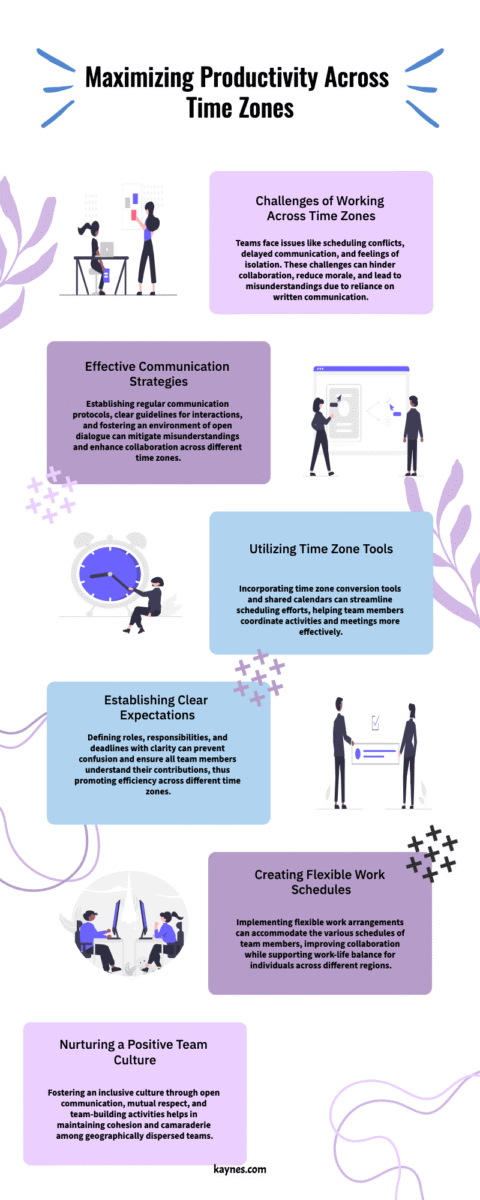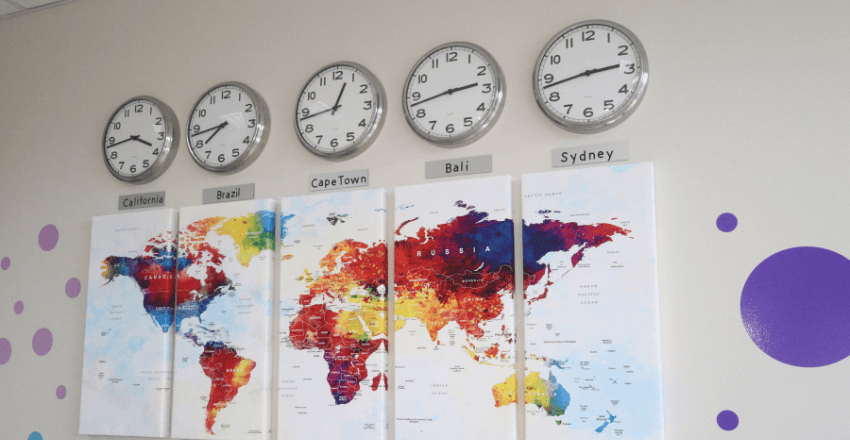
Maximizing Productivity: Mastering Work Across Time Zones
Working across time zones presents numerous challenges for teams and individuals. The primary issue is the disparity in working hours, which can hinder meeting scheduling and collaborative efforts. This often results in delayed decision-making and project progress, as well as limited real-time communication.
Thank you for reading this post, don't forget to subscribe!Furthermore, working across time zones can foster feelings of isolation and disconnection among team members, as they may lack opportunities for in-person interaction or communication during standard working hours. This can negatively impact team morale, cohesion, and the development of strong working relationships. Another significant challenge is the increased potential for miscommunication and misunderstandings.
With team members working at different times, there is a greater reliance on written communication, such as emails and instant messages. This can lead to misinterpretation of tone and intent, as well as delays in receiving and responding to critical information. Additionally, cultural differences and varying communication styles across time zones can contribute to misunderstandings and conflicts within the team.
To work effectively across time zones, it is crucial for individuals and teams to recognize these challenges and proactively address them.

Implementing Effective Communication Strategies
Establishing Regular Communication Channels
One key strategy is to establish regular communication channels and protocols that accommodate different time zones. This can be achieved by setting specific times for team meetings that are convenient for all members, as well as utilizing communication tools that allow for asynchronous communication, such as email and project management platforms.
Clear Guidelines and Prioritizing Transparency
It’s also important to establish clear guidelines for communication, including expectations for response times and the use of language and tone that is inclusive and respectful of cultural differences. Prioritizing transparency and clarity in all communications is vital, including providing detailed information about project timelines, deadlines, and expectations, as well as openly sharing updates and progress reports.
Fostering Open Dialogue and Feedback
By keeping all team members informed and involved, it can help to mitigate misunderstandings and ensure that everyone is on the same page. Encouraging open dialogue and feedback within the team is crucial, so that individuals feel comfortable expressing their thoughts and concerns, regardless of their location or time zone. By implementing these communication strategies, teams can work more cohesively and effectively across time zones.
Utilizing Time Zone Conversion Tools

One practical solution for working across time zones is to utilize time zone conversion tools. These tools can help individuals and teams easily determine the local time in different locations, making it easier to schedule meetings and coordinate activities. There are a variety of time zone conversion tools available, including websites, mobile apps, and integrated features within email and calendar platforms.
These tools can provide real-time updates on time differences, as well as the ability to set up multiple time zones for quick reference. In addition to time zone conversion tools, it can also be helpful to establish a shared calendar or scheduling system that displays the availability of team members across different time zones. This can help to streamline the process of finding mutually convenient times for meetings and collaborative work.
By utilizing these tools, teams can minimize the challenges of working across time zones and improve their ability to coordinate activities and communicate effectively.
Establishing Clear Expectations and Deadlines
| Team Member | Expectations | Deadlines |
|---|---|---|
| John | Complete market research report | Friday, 5 PM |
| Sarah | Prepare presentation slides | Wednesday, 3 PM |
| Michael | Submit project proposal | Monday, 10 AM |
When working across time zones, it is crucial to establish clear expectations and deadlines for all tasks and projects. This includes clearly defining roles and responsibilities for each team member, as well as outlining specific deliverables and timelines. By setting clear expectations, it helps to ensure that everyone understands their individual contributions and the overall goals of the team.
This can also help to minimize misunderstandings and conflicts that may arise due to differences in working hours and communication styles. In addition to clear expectations, it is important to establish realistic deadlines that take into account the challenges of working across time zones. This may involve building in buffer times for communication delays, as well as being mindful of the availability of team members in different locations.
By setting realistic deadlines, it helps to manage expectations and reduce the pressure on individuals to work outside of their regular hours. It is also important to regularly review and adjust deadlines as needed, based on feedback from team members and changes in project priorities. By establishing clear expectations and deadlines, teams can work more efficiently and effectively across time zones.
Creating Flexible Work Schedules
In order to accommodate the challenges of working across time zones, it can be beneficial to create flexible work schedules for team members. This may involve allowing individuals to adjust their working hours to better align with the rest of the team, or providing options for remote work that allow for greater flexibility in managing personal and professional commitments. By creating flexible work schedules, it helps to reduce the impact of time zone differences on productivity and collaboration.
Another approach to creating flexible work schedules is to implement staggered work hours, where team members in different time zones have overlapping periods of availability. This can help to facilitate real-time communication and collaboration, while also allowing individuals to maintain a healthy work-life balance. Additionally, providing options for part-time or reduced hours can help individuals manage the demands of working across time zones without experiencing burnout or excessive stress.
By creating flexible work schedules, teams can better adapt to the challenges of working across time zones and support the well-being of their members.
Prioritizing Tasks and Managing Time Wisely
When working across time zones, it is essential to prioritize tasks and manage time wisely in order to maximize productivity and efficiency. One effective strategy is to prioritize tasks based on their urgency and importance, taking into account the availability of team members in different locations. This may involve identifying critical tasks that require real-time collaboration and coordination, as well as allocating specific times for focused individual work that can be done independently of time zone differences.
Another important aspect of managing time wisely is to establish clear boundaries around work hours and availability. This includes setting specific times for meetings and collaborative work that accommodate the schedules of all team members, as well as respecting the personal time and boundaries of individuals in different time zones. By prioritizing tasks and managing time wisely, it helps to ensure that everyone can contribute effectively to the team’s goals without feeling overwhelmed or overburdened by the challenges of working across time zones.
Nurturing a Positive and Inclusive Team Culture

In order to foster a positive and inclusive team culture when working across time zones, it is important to prioritize open communication, mutual respect, and empathy. This includes actively seeking input from all team members, regardless of their location or time zone, and valuing diverse perspectives and contributions. It also involves promoting a sense of belonging and camaraderie within the team, through virtual social activities, recognition programs, and opportunities for informal interactions.
Another key aspect of nurturing a positive and inclusive team culture is to actively address any issues or conflicts that may arise due to differences in time zones or communication styles. This may involve facilitating open discussions about cultural differences and norms, as well as providing training and resources on effective cross-cultural communication. By nurturing a positive and inclusive team culture, it helps to build trust and cohesion within the team, despite the challenges of working across time zones.
In conclusion, working across time zones presents unique challenges that require proactive strategies and a mindful approach to communication, scheduling, and teamwork. By understanding these challenges and implementing effective solutions, teams can overcome the barriers of distance and time differences to achieve their goals with cohesion and efficiency.
If your team is spread across different time zones, it’s important to have a solid understanding of when to hire in-house and when to outsource.



